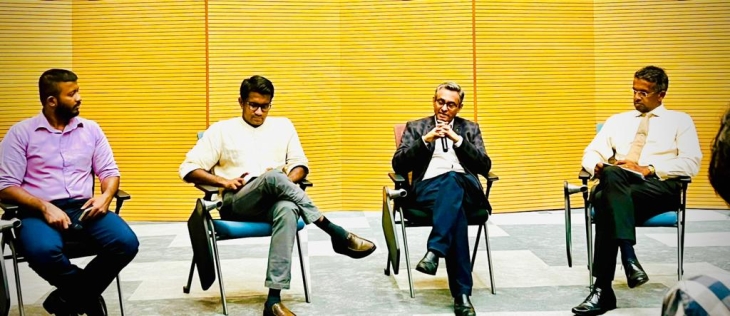The discussion organized by the Lanka Democratic Movement focused on the need for political consensus on crucial economic reforms in Sri Lanka. The speakers pointed out that without a common agreement on key reforms, Sri Lanka's recovery and its ongoing program with the International Monetary Fund (IMF) could be at risk. The speakers emphasized the importance of implementing these reforms without failure and adhering to a plan for a reasonable period of time.
The Convener of the Lanka Democratic Movement, Rasika Jayakody, explained that Sri Lanka is not in a position to move away from the IMF bailout package as the country is in a disastrous situation as far as the economy is concerned. Therefore, Sri Lanka did not have the luxury of choosing when it had the opportunity to negotiate with the IMF on better terms. The country had to pursue the IMF option after becoming a bankrupt nation, and now, it has to swallow a better pill. Jayakody emphasized that it's crucial to implement these reforms without failing, and policymakers must understand the gravity of the situation and move in one direction for at least five years.
Economist Rohan Masakorale emphasized the importance of policy stability in Sri Lanka. Masakorale explained that the country brought its economy on the right track in 1977, and there was significant progress between 1977 and 1982. However, after that, the country lost its way, and the riots in July 1983 caused many global companies that were exploring their investment prospects in Sri Lanka to go to Thailand. Moreover, the war erupted, and Sri Lanka paid a heavy price.
The biggest downfall in Sri Lanka was the successive governments' failure to ensure policy stability. Masakorale pointed out that the Janasaviya program was a progressive attempt to alleviate poverty through sustainable means. However, the government that came to power in 1994 politicized it and created a program that did not produce the desired results. Sri Lanka must understand the gravity of the crisis and take corrective steps with consensus. Today, India has privatized all its ports, and Sri Lanka made a mockery of the plans related to the Easter Container Terminal at Colombo Port. The country wasted three years debating various conspiracy theories, and now it's paying a heavy price for that.
Attorney at Law and Chairman of Citizens for Accountable Governance (CAG), Mangala Niyarepola, emphasized the absence of a master plan in Sri Lanka's economy. He explained that political parties can include any fairy tale in their election manifestos as there is no mechanism to hold them accountable for their promises. Therefore, they end up doing ad-hoc projects without any rational basis, and they can manipulate the media and change public opinion closer to the election. That's why Sri Lanka has ended up in this mess.
Niyarepola emphasized that when there is no master plan, no rule of law, no mechanism to hold politicians accountable, and no transparency, no serious investor will come to the country. The majority of so-called investors coming to such a country could be driven by vested interests, which is a failure in the system that Sri Lanka must address. The country needs a grand master plan that has constitutional protection, an all-encompassing document prepared by experts and technocrats. Political parties should not be allowed to deviate from the master plan without a referendum, and an institutional framework must be set up to implement this master plan with the participation of the public. This is the only way Sri Lanka can drive the much-talked-about "system change." The panelists highlighted that not having a common consensus on key reforms could derail Sri Lanka's recovery and its ongoing program with the International Monetary Fund (IMF).
However, achieving political consensus is no easy task in Sri Lanka's current political climate. The absence of a master plan, policy stability, and transparency has resulted in ad-hoc projects and a lack of accountability. Political parties can manipulate the media and change public opinion closer to elections, which ultimately leads to a lack of trust in the government.
The current crisis in Sri Lanka's economy demands immediate attention and action. The government and policymakers must prioritize achieving political consensus on crucial economic reforms, implementing them effectively and efficiently, and working towards a grand master plan that will protect Sri Lanka's economic future. Without political consensus, Sri Lanka's economy may continue to face instability and challenges that could have far-reaching consequences for the country and its people.










